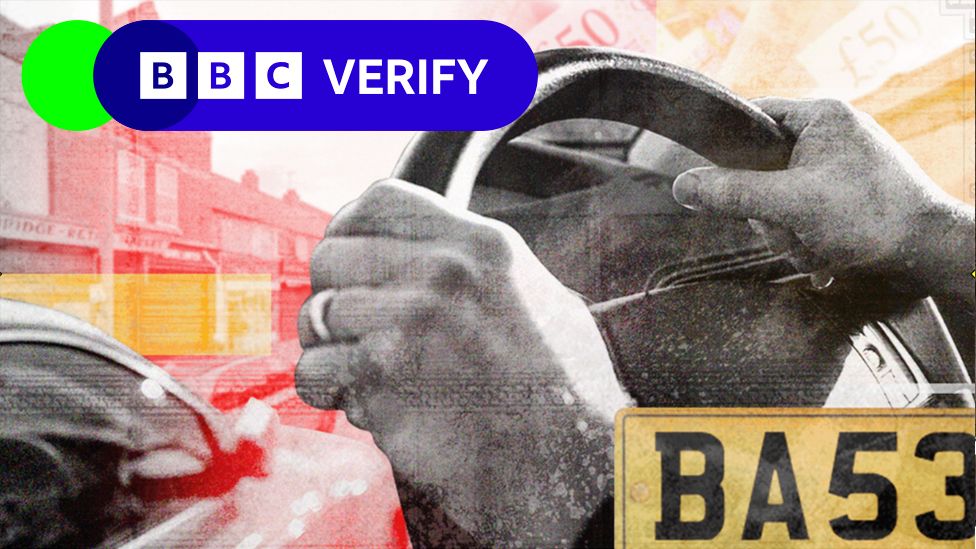Car insurance quotes higher in ethnically diverse areas
- Published

Car insurance quotes were a third more expensive in some areas of England with the biggest minority ethnicity populations, BBC Verify has found.
We collected thousands of quotes based on identical driver information, but with different addresses.
Areas with a high number of people from ethnic minorities saw higher prices, even when road accident and crime levels were similar.
The insurance industry body said ethnicity was not a factor in pricing.
But Citizens Advice said the findings added to evidence of an "ethnicity penalty".
Address effect
When you apply for car insurance, the price takes into account factors including your address, age and driving history.
But it is not known exactly how that calculation works, because insurance firms do not make the information publicly available.
To shed some light on this process, we tested the effect of changing a driver's address on the cost of insurance.
We chose 6,000 addresses from a spread of more and less wealthy and diverse areas, selecting 20 in the most deprived and 20 in the least deprived for each English local authority.
All other details like the driver's age, job, driving history and car model were kept the same.
Crime and road accident levels, both of which are known to affect insurance premiums, were also taken into account.
Higher quotes
On average, car insurance quotes were 33% higher in the most ethnically diverse parts of England, compared with the least diverse.
For example, the quotes - for a 30-year-old teacher driving a Ford Fiesta - averaged at £1,975 if they lived in the Princes End area of Sandwell, near Birmingham. But in the nearby Great Bridge area, the average was £2,796.
The two areas have similar scores for road accidents and crime, according to a government measure called the Index of Multiple Deprivation (IMD), but Great Bridge has a larger black, Asian and minority ethnic population. Overall crime levels or the type of accidents measured by the IMD do not capture everything used to calculate insurance risk.
Calls for transparency
A spokesperson from the Association of British Insurers (ABI) said: "Insurers do not and cannot use ethnicity as a factor when setting prices and our members comply with the Equality Act 2010.
"However, we recognise that these and other similar findings raise an important public policy debate."
Concerns have been raised before around insurance companies' algorithms leading to people from ethnic minorities facing higher premiums.
In 2019, industry regulator the Financial Conduct Authority (FCA), found several companies could not provide details of what factors were taken into account, or how they ensured they did not breach the Equality Act 2010.
And a 2023 Citizens Advice survey of 15,000 people found that people from ethnic minorities were charged 40% on average more than white people.
David Mendes da Costa, principal policy manager at Citizens Advice, said the FCA needed to "get off the sidelines and investigate why people of colour are being charged so much more".
"And if insurers can't explain, the FCA must move fast to end this practice for good."
An FCA spokesperson said it was looking into the concerns.
"We recently asked the largest motor insurers to show us how they ensure their pricing models do not discriminate based on ethnicity, and we are reviewing their responses.
"The law is clear that insurers must not discriminate based on certain characteristics, like race and ethnicity.
"They need to be sure, and be able to reassure us, they are not doing so. Our rules also mean insurers should only sell products that provide fair value to their customers."
Clarification 27 March: This article has been amended to add context about the limitations of the IMD in assessing insurance risk and to change a subheading that was not clearly attributed to Citizens Advice.
Are you affected by the issues raised in this story? Share your experiences by emailing haveyoursay@bbc.co.uk, external.
Please include a contact number if you are willing to speak to a BBC journalist. You can also get in touch in the following ways:
WhatsApp: +44 7756 165803
Tweet: @BBC_HaveYourSay, external
Please read our terms & conditions and privacy policy
If you are reading this page and can't see the form you will need to visit the mobile version of the BBC website to submit your question or comment or you can email us at HaveYourSay@bbc.co.uk, external. Please include your name, age and location with any submission.
- Published22 March 2022